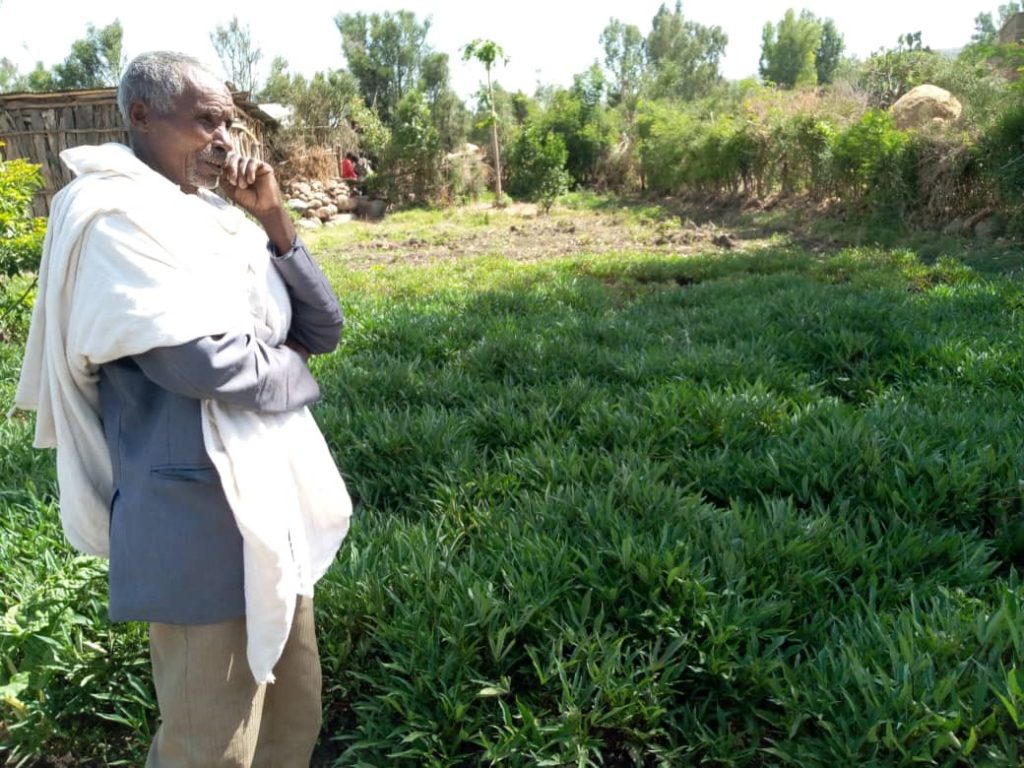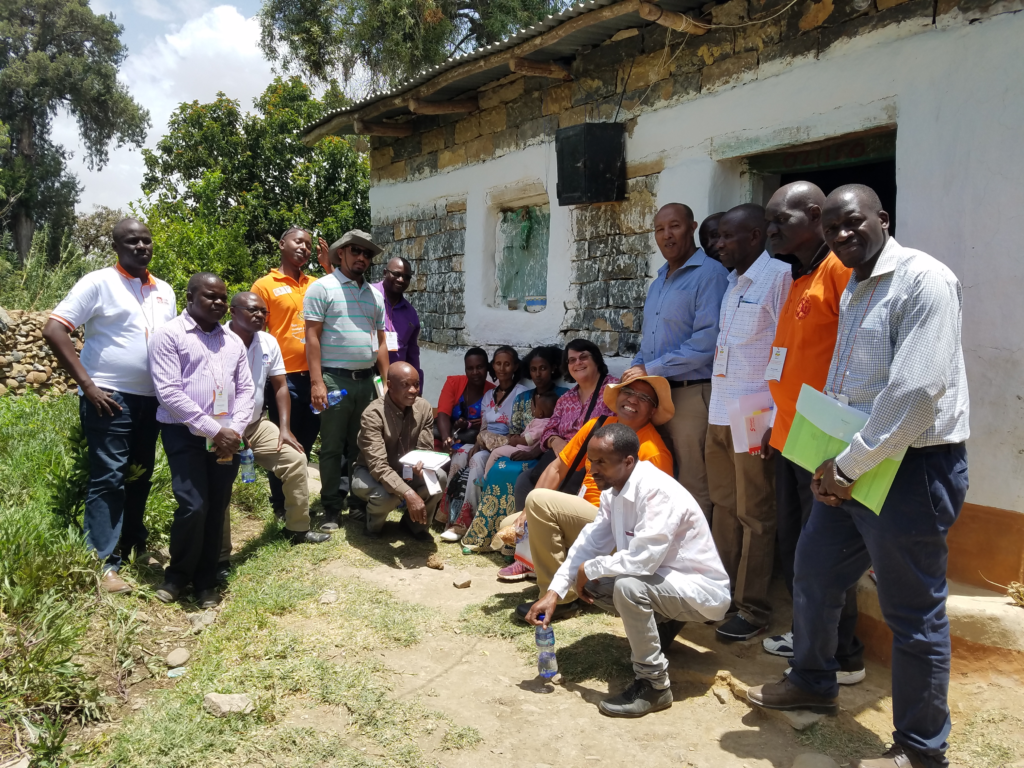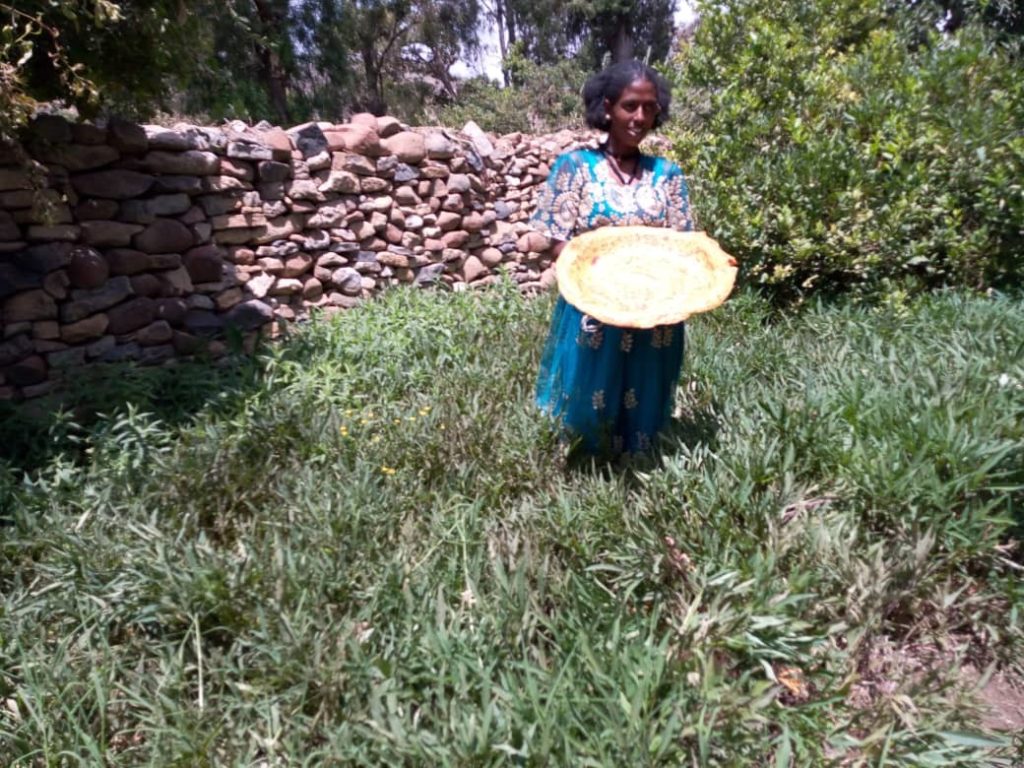‘Our lives have changed for the better since the introduction of this crop five years ago’ Abeba Gerezehier and Mulu Birhanu, farmers in the Chelekeot village, told a section of participants from the 11th Consultation of the Seed Systems and Crop Management Community of Practice meeting. The participants drawn from partner National Research Institutes (NARIs), NGOs and International Potato Center were visiting the village on a learning journey as part of the meeting in a bid to understand and appreciate sweetpotato seed systems and production in the region.
Orange Fleshed Sweetpotato (OFSP) was introduced to the farmers in this village, 12 km south of Mekelle, in 2014. The area was selected because it has an agro-ecology suitable for OFSP production. The degree of food insecurity prevalent in the area and closeness to an urban market was also considered. It is now considered a nutritious, food security and income generating crop in the village.

Abeba Gerezehier in his sweetpotato plot during the field visit of participants in 1ith COP, Agronomy and seed system. Photo credit. Jean Claude (CIP-Rwanda)
The Tigray region where this village is located is very dry and farmers survive by using irrigation throughout the year. Some years ago, the dominant crops grown in the village were wheat, teff, maize, lima beans and many types of vegetables. They did not know about OFSP and the opportunity to change the lives of many farmers in the village. ‘My wife learnt, that OFSP is rich in vitamin A and protected children against malnutrition from a farmers’ association she is part of. She then received vines from district agricultural officers and the Tigray Agricultural Research Institute. That is how we started farming OFSP and still do so until now.’’ said Gerezehier.
The learning journey to this village took place on 14th May 2019 and the main purpose of this visit was to share and understand farmers’ experiences in OFSP production, processing, consumption and marketing as well as the challenges they encountered. Gerezehier and Birhanu were part of the first group of 20 pioneer farmers who were selected in their Kebele to grow to grow different nutritious crops including OFSP. From the initial planting materials obtained from TARI, the two farmers have continuously grown the crop for the last of five years on 150 sqm and 40sqm of irrigable land respectively.
While the first production of vines was shared with neighbours to introduce them to the new crop, in the last three years, the two farmers have cultivated OFSP for vines and roots for both sales and home consumption and as feed for livestock. Gerezehier and Mulu have sold vines at 11,500 (USD 410) and 7,500 (USD 267) birrs in total respectively. They rank sweetpotato as number one because of the income they get from both vine and root sales. The main buyers of vines are NGOs, the Bureau of Agriculture as well as other big vine multipliers. Gerezehier indicated that he sells half of the roots he produces and uses the other half for household consumption. In addition to eating the roots boiled, Birhanu uses OFSP puree mixed with wheat flour or teff flour for making bread and injera with a ratio of 1:3 and 1:4 (1part OFSP puree to 3 parts wheat flour and 1 part OFSP puree to 4 parts teff flour )


The main challenges affecting the OFSP farmers in Chelekeot village are: lack of the required registration document as vine multipliers which means they cannot sell vines legally; inadequate labour and small portions of irrigated area . Farmers address these challenges by selling through registered vine multipliers and by using family labour when available. They are all motivated by the availability of nutritious food for household consumption throughout the year; availability of feed for their livestock and income for school fees and for the purchase of household appliances like TVs and cupboards.
When asked about their future plans, Abeba and Malu both said they intend to expand their production area as they see a good future in OFSP vine and root production. They are also seeking assistance to register as vine multipliers through farmer cooperatives so that they can sell their vines directly to the market.
A Learning Route (LR) is a planned journey with learning objectives that are designed based on i) the knowledge needs of development practitioners that are faced with problems associated with rural poverty and, ii) the identification of relevant experiences in which local stakeholders have tackled similar challenges in innovative ways, with successful results and accumulated knowledge which is potentially useful to others. The Route allows for the experiential encounter between travelers and hosts, both having mutually useful experiences and knowledge. For more information on LRs, visit www.africa.procasur.org.
By Jean Claude Nshimiyimana (edited by Rosemary Kihiu and Faith Njunge)
1 Comment. Leave new
[…] […]